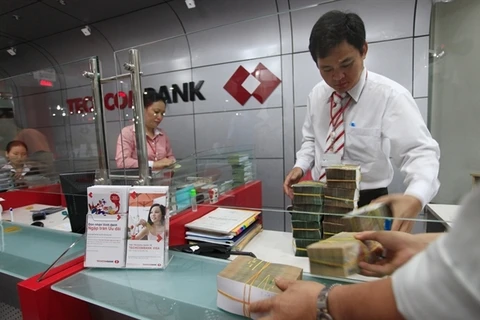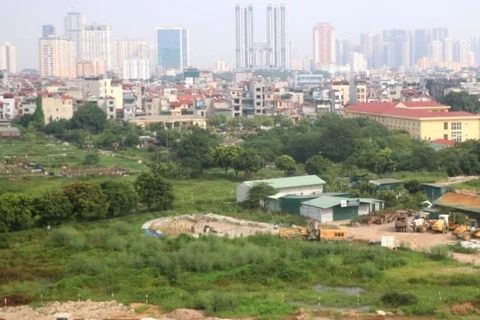Hanoi (VNA) - Prime Minister Pham Minh Chinh has ordered the banking sector to tightly supervise capital flows into the real estate sector and the stock market to prevent speculation.
Basic solutions needed
Speaking at a recent working session with leaders of the State Bank of Vietnam (SBV), PM Chinh requested that the SBV pay heed to data synthesis and analysis in order to control credit effectively for risky areas such as real estate and securities.
He emphasised the need to develop solutions for a stable and healthy financial system and balance the monetary and capital markets to reduce pressure on the supply of capital from credit institutions, thereby meeting the medium and long-term capital mobilisation needs of the economy.
He asked the State Bank of Vietnam to develop a suitable plan in response to the COVID-19 pandemic and create favourable conditions for people and businesses to access capital sources to restore their production.
Regarding the restructuring and refinancing of bad debts, the PM said the central bank needs to coordinate with relevant ministries and sectors to create appropriate mechanisms that will attract domestic and foreign investors to join the effort.
The government leader asked the State Bank of Vietnam to devise both immediate and long-term solutions to handle bad debts and control the percentage of bad debts effectively.
PM Chinh urged the bank to accelerate the introduction of modern technologies in the financial and banking sector to improve convenience and safety for people using financial services.
The central bank should closely coordinate with relevant ministries and sectors to expedite capital increases for State-owned commercial banks and create favourable conditions that will allow banks to become more competitive and accelerate international integration, the PM said.
Attention should be paid to improving the legal corridor that will facilitate the development of innovative technologies and contribute to the evolving digital economy, he noted.
Ensuring stability of macro-economic balances
Addressing the meeting, the SBV's Governor Nguyen Thi Hong said the bank has used various tools to control credit risks in both the real estate and securities sectors, including reducing the ratio of short-term loans being used for mid- and long-term loans, applying a high-risk adjustment coefficient to such loans and limiting outstanding loans for businesses involved in securities and investment.
The results showed that the growth rate of credit in the real estate sector has slowed and outstanding loans for securities and investment account for a small proportion of the total credit balance, Hong said.
In order to prevent risks of the banking system, the State Bank of Vietnam requires credit institutions to focus on managing and controlling risks in all aspects of operations and strictly controlling the use of loans for the right purposes, the governor noted.
The SBV's report also showed that Vietnam's credit-to-GDP ratio stands at over 140 percent, which places Vietnam amongst the countries with the highest rates in the world, according to international standards. If the ratio continues to increase and medium and long-term loans rely heavily on banks, it will put great pressure on the capital balance of the banking system.
Small and medium-sized enterprises (SMEs) account for over 90 percent of the total number of firms in Vietnam but their access to capital is limited because their financial capacity, governance, feasible business plans and cash flow management ability remain limited, Hong said.
She suggested the PM and the Government pay attention to SMEs and provide stronger support mechanisms for them.
The State Bank of Vietnam will continue to direct credit institutions to reduce inefficient procedures, making it easier for businesses and people to access credit sources, she noted.
Regarding bad debts, Hong said the bad debt rate is increasing due to impacts of the COVID-19 pandemic.
She also pointed out recent challenges facing the banking system saying that the biggest problem right now is the lack of a synchronous legal framework for developing issues such as peer-to-peer lending and digital money management./.



























